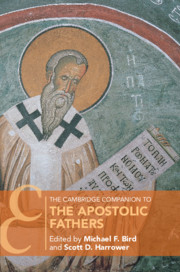Book contents
- The Cambridge Companion to the Apostolic Fathers
- Cambridge Companions to Religion
- The Cambridge Companion to the Apostolic Fathers
- Copyright page
- Contents
- Contributors
- Abbreviations
- Introduction Intriguing and Enigmatic
- 1 The Roman Empire in the Era of the Apostolic Fathers
- 2 The Image of Jews and Judaism in the Apostolic Fathers
- 3 Second-Century Diversity
- 4 The Jesus Tradition in the Apostolic Fathers
- 5 The Text of the New Testament in the Apostolic Fathers
- 6 The Reception of Paul, Peter, and James in the Apostolic Fathers
- 7 Between Ekklēsia and State
- 8 Church, Church Ministry, and Church Order
- 9 The Apostolic Mothers
- 10 1 and 2 Clement
- 11 The Letters of Ignatius
- 12 Polycarp’s Epistle to the Philippians and the Martyrdom of Polycarp
- 13 Didache
- 14 The Epistle of Barnabas
- 15 The Shepherd of Hermas as Early Christian Apocalypse
- 16 The Epistle to Diognetus and the Fragment of Quadratus
- 17 The Fragments of Papias
- Sources Index
- Subject Index
- Cambridge Companions to Religion (continued from page )
- References
9 - The Apostolic Mothers
Published online by Cambridge University Press: 28 May 2021
- The Cambridge Companion to the Apostolic Fathers
- Cambridge Companions to Religion
- The Cambridge Companion to the Apostolic Fathers
- Copyright page
- Contents
- Contributors
- Abbreviations
- Introduction Intriguing and Enigmatic
- 1 The Roman Empire in the Era of the Apostolic Fathers
- 2 The Image of Jews and Judaism in the Apostolic Fathers
- 3 Second-Century Diversity
- 4 The Jesus Tradition in the Apostolic Fathers
- 5 The Text of the New Testament in the Apostolic Fathers
- 6 The Reception of Paul, Peter, and James in the Apostolic Fathers
- 7 Between Ekklēsia and State
- 8 Church, Church Ministry, and Church Order
- 9 The Apostolic Mothers
- 10 1 and 2 Clement
- 11 The Letters of Ignatius
- 12 Polycarp’s Epistle to the Philippians and the Martyrdom of Polycarp
- 13 Didache
- 14 The Epistle of Barnabas
- 15 The Shepherd of Hermas as Early Christian Apocalypse
- 16 The Epistle to Diognetus and the Fragment of Quadratus
- 17 The Fragments of Papias
- Sources Index
- Subject Index
- Cambridge Companions to Religion (continued from page )
- References
Summary
In a debate with Origen over the interpretation of Paul’s invitation to fools (not the wise) to join the Christian movement, Celsus argues that Christianity is a religion of the stulti – women, children, and slaves (Cels. 3.44). Origen counters that the statement is a faulty generalization, jumping to a conclusion about all reached on the basis of just a few. Conversely, the history of early Christianity frequently emphasizes the history of men and male authors, without sufficient attention drawn to the role and significance of women in the early church. This short essay focuses on Christian women of the first four centuries either named as apostles, or playing the same role as apostles, or remembered as having done so, in a direct line of succession to the companions or early followers of Jesus. The title “Apostolic Mothers” is based, of course, on the title, “Apostolic Fathers” – not a group of writers, but a collection of texts, some undoubtedly pseudonymous. According to new research, the question of who devised the title “Apostolic Fathers” is debated, coming down to a choice between bookbinders and librarians. The collection includes writings attributed to figures including Barnabas, Clement of Rome, Diognetus, Hermas, Ignatius, and Polycarp. These writings seem to have been clustered, not because their authors were “apostles” (although the historical Barnabas was contemporaneous with the apostles), but because they were regarded as post-apostolic, i.e., in a direct line of succession from Jesus’ apostles. That said, not all “apostolic fathers” fit a single definition of “apostolic.” It is thus impossible to feminize the definition (“apostolic mothers”) without additional clarification. In this essay, the title is employed to refer to named female leaders of the church: (1) not referred to as “apostle” in the NT, but acting in a parallel fashion to the apostles, irrespective of their dominant NT role or the tradition about their role; (2) in a direct line of succession (real or fabricated) from Jesus’ apostles; and (3) contemporaneous with the purported authors of the “apostolic fathers” (i.e., first and second century CE). While both martyrs (e.g., Ignatius, Polycarp) and teachers (e.g., Diognetus) figure among the apostolic fathers, I have excluded women in these roles if we lack evidence for their even fictional succession to the apostles of Jesus. Thus, the martyrs Perpetua and Felicity are not considered here, nor for the same reason are the following writers: Faltonia Betitia Proba, 320–370 CE; Marcella, 327–410 CE; Macrina the Younger, 330–379 CE; Melania the Elder, 340–410 CE; Paula, 347–404 CE; Egeria, 380s CE and Aelia Eudocia Augusta, 400–460 CE. Likewise, prophetesses, such as Prisca and Maximilla (Montanism) and nameless female leaders in catacomb art such as the third-century fresco Fractio Panis have been excluded.
- Type
- Chapter
- Information
- The Cambridge Companion to the Apostolic Fathers , pp. 175 - 185Publisher: Cambridge University PressPrint publication year: 2021



